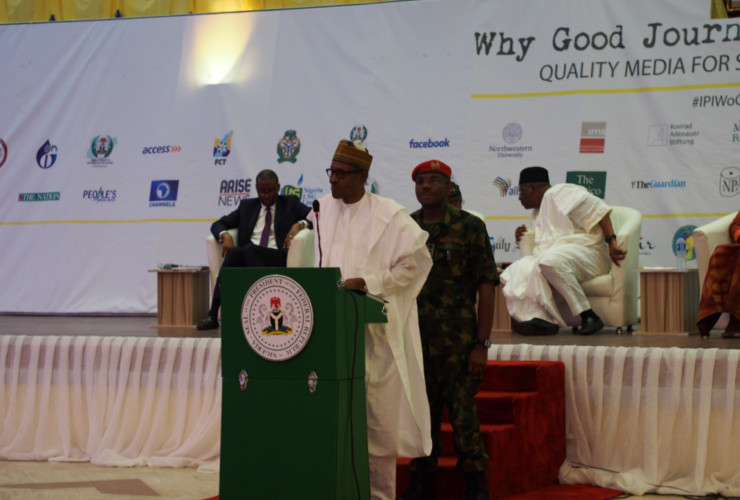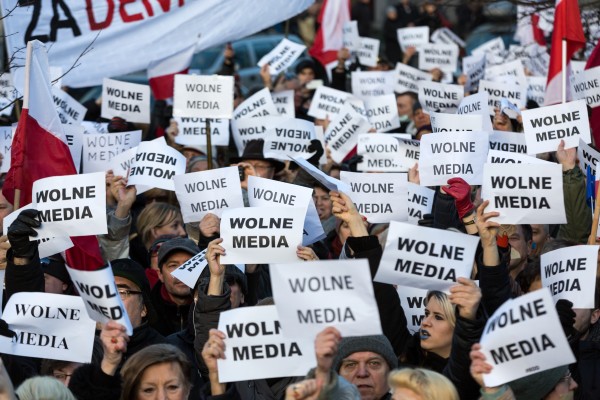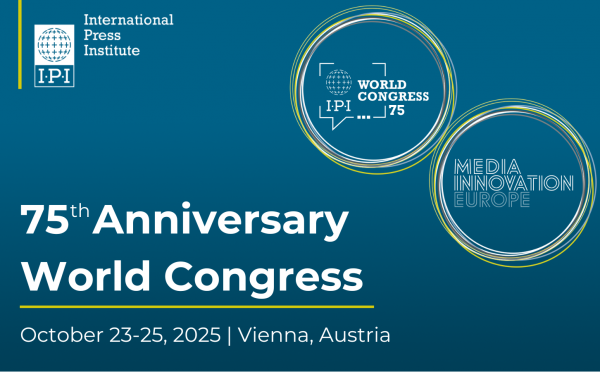Nigerian President Muhammadu Buhari today opened the 2018 International Press Institute (IPI) World Congress in Nigeria by underscoring the importance of quality journalism to building strong societies.
“Good journalism promotes good governance”, Buhari told an audience of around 300 Nigerian and international journalists at the World Congress opening ceremony, hosted at the president’s villa in Abuja.
Buhari also sought to draw a distinction between quality journalism and what he described as hate speech and “fake news”.
“In a world where the borderline between hate speech and free speech has become blurred, good journalism matters”, he said. “In an environment where fake news dwarfs investigative reporting, good journalism matters.”
The president’s remarks came shortly after IPI Executive Board Chair John Yearwood urged him to secure the freedom of Jones Abiri, a Nigerian journalist who disappeared two years ago and is believed to be held by the Department of State Security (DSS).
“We hope that (Abiri) will be with us as a free journalist at our next gathering”, Yearwood said.
Dozens of high-level Nigerian government officials and media representatives joined international journalists and editors from more than 40 countries for the ceremony, which kicked off with a panel discussion featuring four Nigerian federal government ministers on key challenges facing Africa’s most-populous country.
The panel was moderated by John Momoh, president of the Broadcasting Organisation of Nigeria and the CEO of Channels TV, an IPI corporate member. Questioned critically by Momoh on Nigeria’s progress toward future prosperity, Nigerian Finance Minister Kemi Adeosun, Interior Minister Abdulrahman Dambazau, Minister of Information and Culture Lai Mohammed and Minister of Trade and Investment Okey Enelamah largely defended the current government’s record ahead of 2019 elections but also offered first-hand insight into issues ranging from tax evasion to border surveillance to desertification.
IPI Executive Board Vice Chair Dawn Thomas, CEO of Trinidad and Tobago’s One Caribbean Media Ltd., welcomed Congress participants on the Executive Board’s behalf. Thomas described the decision to host IPI’s 2018 Congress in Nigeria in part as an acknowledgement of the country’s historical importance to the IPI’s community. She noted that Nigeria was a key focus of IPI’s Africa programme in the 1960s and 70s, when IPI established the Lagos-based Nigerian Institute of Journalism (NIJ), which remains one of Nigeria’s most respected journalism schools.
Referencing growing efforts by governments to harass and smear the media, IPI Executive Director Barbara Trionfi noted that the Abuja Congress opened amid a “sense that independent journalism is under attack” around the world.
The Congress, she said, served as a reminder of the power and potential of solidarity in the global journalist community and the need to better communicate why journalism matters.
“If we cannot convince our readers that independent, quality journalism is a valuable good, it will be very easy for those who want to silence critical journalism to do so”, she remarked.
Under the theme “Why Good Journalism Matters: Quality Journalism for Strong Societies”, the 2018 Congress marks the first time IPI has held its flagship global press freedom event in West Africa.
The second day of the Congress will start with a town-hall-style discussion on “Why Good Journalism Matters” featuring leading editors and media executives from the BBC, The Associated Press, Al Jazeera, The Philippines’s Rappler and South Africa’s Mail & Guardian. The afternoon will be dedicated to the Africa Media Forum, which will see leading African journalists, editors, academics and tech representatives debate the future of press freedom and independent journalism in Africa.



